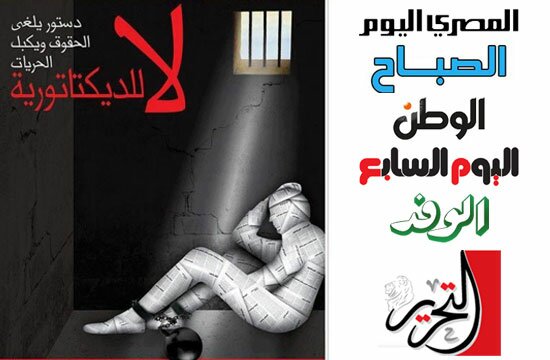Tuesday, Dec. 4 - Egyptian police faced ten thousand protesters outside President Mohamed Morsi’s palace in Cairo on Tuesday, prompting the Islamist leader to escape during the early moments of the demonstration, which moved from Tahrir Square today to the Presidential Palace.
Officers fired teargas at the demonstrators, who have been gathering in growing numbers. They have been angered by Morsi’s drive to consolidate sweeping powers for himself, marginalize the courts, and hurriedly draft a national constitution that will solidify the Muslim Brotherhood’s hold on the country and impose Shariah law. Morsi has just announced that he plans to hold a referendum on a new constitution on December 15.
Some of the demonstrators broke through police lines around his palace and protested next to the perimeter wall.
 Meanwhile independent Egyptian newspapers suspended publication Tuesday as protesters prepared for marches amid mounting anger over the hurried drafting of the country’s new constitution adopted by an Islamist-led panel.
Meanwhile independent Egyptian newspapers suspended publication Tuesday as protesters prepared for marches amid mounting anger over the hurried drafting of the country’s new constitution adopted by an Islamist-led panel.
The media protest involved at least eight influential dailies and was part of a planned campaign of civil disobedience that could bring in other industries and build on an ongoing strike by Egypt’s judges. Virtually every paper involved in the protest published the photo at left on the front page of their Tuesday edition.
The draft constitution has been criticized for not protecting the rights of women and minority groups, and many journalists see it as restricting freedom of expression. Critics also say it empowers Islamic religious clerics by giving them a say over legislation, while some articles were seen as tailored to get rid of Islamists’ enemies.
The country’s privately owned TV networks are planning their own protest Wednesday, when they will blacken their screens all day.
The controversy over the draft has widened Egypt’s political crisis and deeply divided the Arab nation nearly two years after the ouster of authoritarian president Hosni Mubarak.
The country’s judges have already gone on strike over Mr. Morsi’s Nov. 22 decrees that placed him above oversight of any kind, including the courts. Following those decrees, the constitutional panel rushed through a draft constitution without the participation of representatives of liberals and Christians. Only four women, all Islamists, attended the marathon, all-night session.
The crisis has divided the country into two camps. The President and the Muslim Brotherhood, as well as another ultraconservative Islamist group, are facing off against youth groups, liberal parties, and large sectors of the public, who were the original protesters in what became Egypt’s so-called “Arab Spring” .
The opposition have shown their strength in the 200,000 protesters who came to Cairo’s Tahrir Square at the end of November, demanding that Mr. Morsi’s sweeping decrees be rescinded. Many of them have been camping out in the square for close to two weeks.
On Saturday, December 1, the Islamists countered by sending out their own hundreds of thousands of supporters into Cairo’s twin city of Giza and in other cities across the country. Thousands also laid siege to Egypt’s highest court, the Supreme Constitutional Court, at which point the judges went on strike.
